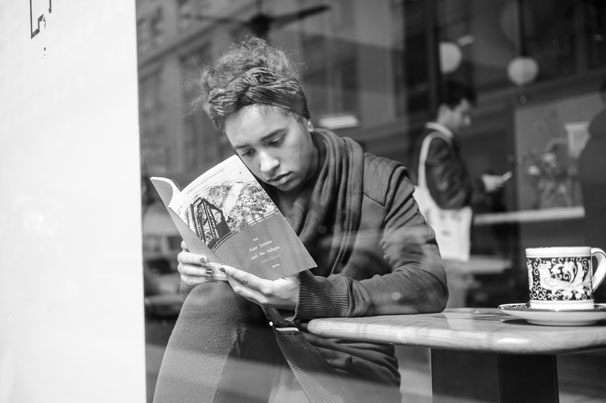
It took a few minutes scanning the room for Aziza Barnes and I to finally find each other, unknowingly sitting side by side. We laugh and she takes a seat opposite me. Her mellow voice speaks easily and, at times, hints at the strength with which she performs. We meet with a handshake but part with a hug, a clear sign of the poet’s humble and welcoming persona that mirrors the style of her poetry.
The Los Angeles native is no stranger to the tension surrounding her race. People of her own color have ridiculed her for not being as dark as they were.
“I’m a brown girl with lighter skin [and] they would always say, ‘Oh girl, you don’t know what it means. You ain’t been through what we have,’ and it hurt because it was completely untrue,” Barnes said. “They’d say, ‘Oh you don’t sound black enough. You too white, girl. You an Oreo.’”
Barnes wrote her first poem at 9 years old. The piece was about her hair, inherited from her mother, which many black women had told her was “good hair” because of her looser curls. She said her poem challenged the notion of what truly was a “good” black trait to have. Already, her art began showing signs of her insightful nature.
When Barnes came to the Tisch School of the Arts, she began writing more poetry, as well as performing it. Her first performance, a self-described mess compared to her current standards, was in a pool of widely revered poets chosen by NYU alumnus Beau Sia.
“We laugh about it now, but it really was terrible,” Barnes said. “I closed my eyes the entire time, and the poem was about how I lost my virginity. Oh, it was bad.”
But by viewing YouTube videos of her performances or reading her work in her first published book, “me Aunt Jemima and the nailgun,” one would never suspect this early awkward phase. The poise, sharpness and fire with which her words roll off her tongue are emotionally stirring. The majority of her work grapples with racial identity. This theme is something that Barnes said has evolved over time and she hopes will continue to evolve.
“This body, this thing you live in, is different everywhere you take it, and I’m obsessed with that,” Barnes said. “I studied abroad in Ghana, and I tried to tell the people there, ‘Oh look, we’re the same, you know. My skin is your skin,’ and they would not have it. I’d say, ‘No, my ancestors were slaves who were taken from this place. My origin is here.’ But it was a completely different culture — something that I wasn’t a part of.”
Now a senior, Barnes is a proud member of the NYU Slam group, professionally recognized from publications like Muzzle and a poet published by Button Poetry Press. Barnes was the winner of the company’s inaugural competition, the grand prize being the publication of her first collection.
“Everyone who edited [the book] really kept true to the intent because it was their first time, and it has so much warmth and genuineness that really is so great and so important,” Barnes said.
This success has not slowed her down or made her lose sight of her work, though. Still an avid writer, Barnes stressed the importance of constantly honing her craft. Whether it is through books, art museums or even Netflix, she finds inspiration in everything and never stops looking for it.
“It’s more important to listen than to speak,” Barnes said.
With creativity always flowing, Barnes will take some time off from education after graduating to continue workshops she already teaches around the city. She enjoys the thrill of sharing her craft and eventually would like to teach to all levels of poets. She later plans to pursue a Master of Fine Arts in poetry — just another step that will help her fulfill her biggest goal for the future.
“I guess the ultimate dream is to have a huge acre of land somewhere where I can just sit on my ass in my house, write all day and send [the material] out to be published.”
— David Bologna

























































































































































